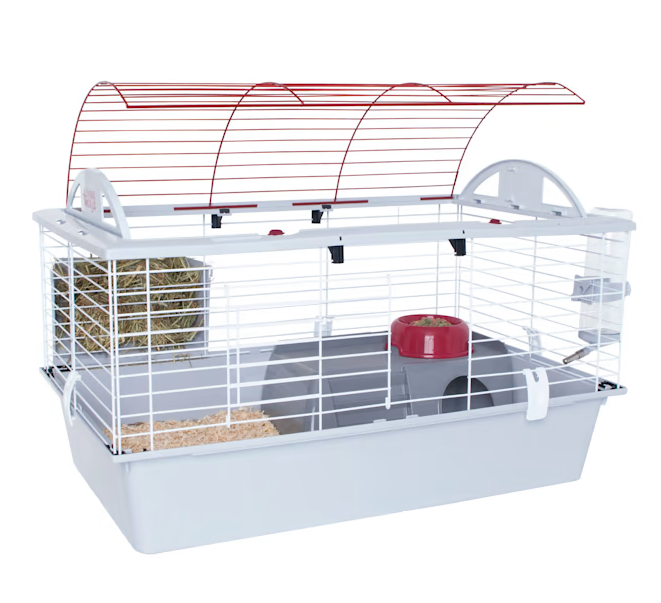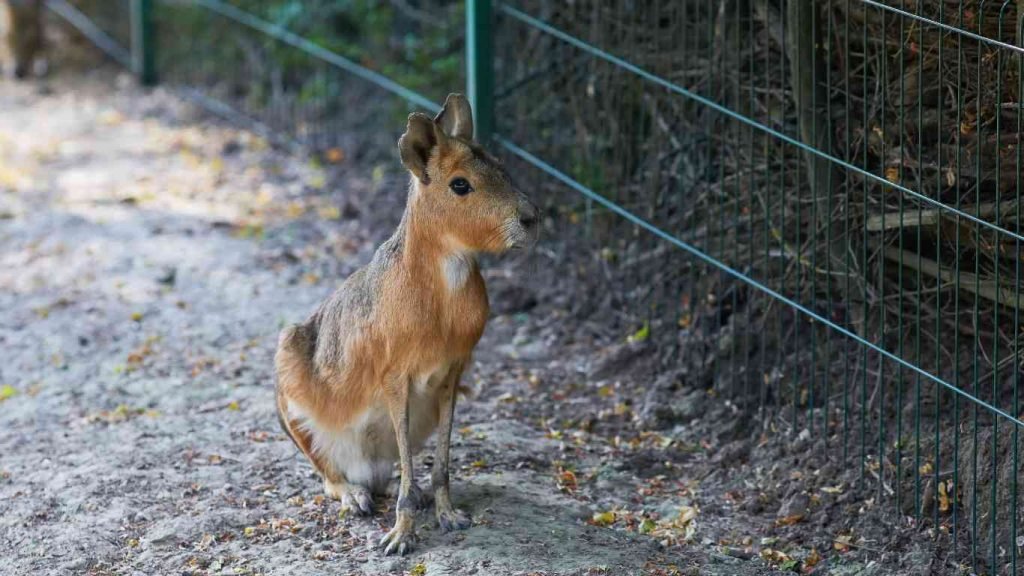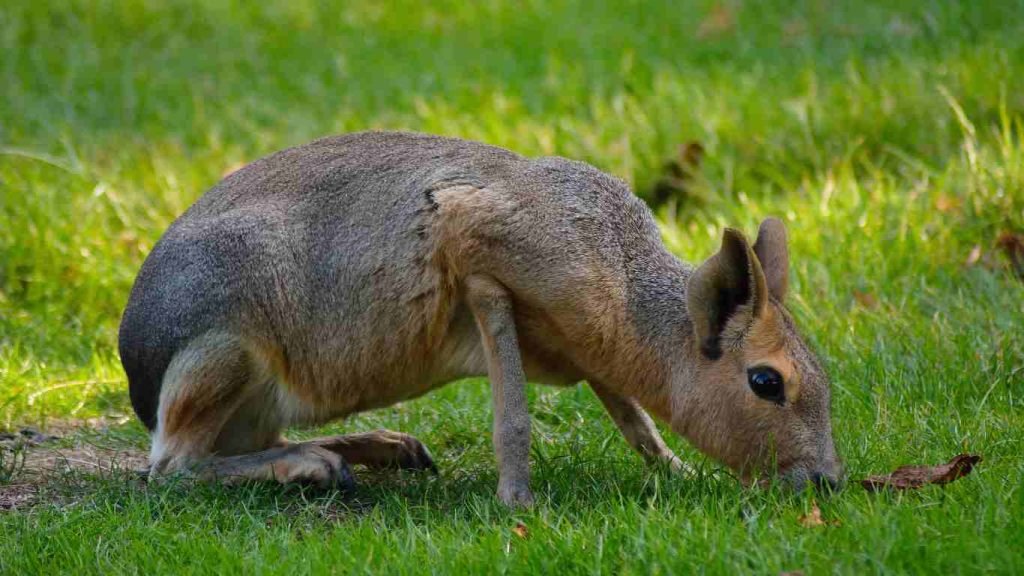Domestic, Facts, Patagonian Mara
Are Patagonian Cavies Legal in the United States? Find Out!
If you’re considering owning a Patagonian cavy, also known as a Patagonia cavy, mara, or dillaby, it’s important to understand the legal implications. These large, docile rodents make interesting pets, resembling guinea pigs and possessing a friendly and affectionate nature. However, the legality of owning a Patagonian cavy varies by state.
Are Patagonian Cavies Legal in the United States?
As of 2020, Connecticut is the only state where owning a Patagonian mara is explicitly legal. Other states, such as Oregon, Alabama, Washington, and Texas, allow ownership without requiring a permit. However, states like California, Georgia, New Hampshire, Colorado, and Hawaii either ban ownership or have strict permit requirements.
It is essential to check with your state and local municipality to determine if owning a Patagonian cavy is legal in your area.

Physical Characteristics and Care of Patagonian Cavies
Patagonian cavies, also known as Patagonia cavies, maras, or dillabies, are fascinating creatures with unique physical characteristics. These large, docile rodents can grow up to 18 inches in length and weigh up to 35 pounds. Their long legs and slender bodies allow them to move swiftly and gracefully. They have a lifespan of about 14 years in captivity, making them long-term companions.
When it comes to caring for Patagonian cavies, it’s important to provide them with a proper diet and a suitable enclosure. These herbivores require a diet that consists of hay, such as timothy hay or alfalfa, as well as commercially prepared rodent or guinea pig food. Dark, leafy greens and fresh grass should also make up a significant portion of their diet, providing them with essential nutrients.
In terms of housing, Patagonian cavies need a spacious and secure enclosure both indoors and outdoors. They are skilled diggers and jumpers, so precautions must be taken to prevent them from escaping. Outdoor enclosures should be at least 10 feet square with access to grass for grazing, and a secure dog house should be provided for shelter. If kept indoors, they require supervision to prevent any damage to furniture and belongings.
Table: Physical Characteristics of Patagonian Cavies
| Physical Characteristic | Description |
|---|---|
| Size | Up to 18 inches in length |
| Weight | Up to 35 pounds |
| Lifespan | About 14 years in captivity |
By understanding the physical characteristics and care requirements of Patagonian cavies, you can provide them with the proper attention and environment they need to thrive.

Social Behavior and Training of Patagonian Cavies
Patagonian cavies are highly social animals that thrive when they have companionship and interaction. In the wild, they are usually found in pairs or small groups, living in close proximity to one another. When kept as pets, they can be socialized and become affectionate towards their owners if they are raised from a young age with proper attention and human contact.
“Patagonian cavies are not prone to biting and can enjoy snuggles and belly rubs,” says Dr. Jane Peterson, an exotic pet veterinarian.
They have a friendly nature and can form strong bonds with their owners. Male cavies may engage in scent marking by marking their territory with urine and anal gland secretions. Females, on the other hand, are less likely to exhibit this behavior.
“Socialization and training should be a consistent part of their daily routine,” advises Dr. Peterson. This includes regular playtime, handling, and positive reinforcement training. Patagonian cavies can be trained to use a litter box and walk on a leash, making them versatile pets for owners seeking interactive companions.”
To promote positive social behavior and ensure a well-rounded pet, it’s important to provide mental stimulation and enrichment activities for Patagonian cavies. This can include puzzle toys, hiding treats for them to find, or providing tunnels and obstacles for them to explore. By engaging their natural instincts and providing opportunities for social interaction, you can help your Patagonian cavy thrive in a domestic environment.

Table: Common Behaviors of Patagonian Cavies
| Behavior | Description |
|---|---|
| Snuggling | Patagonian cavies can enjoy close physical contact and may seek out snuggles with their owners. |
| Belly rubs | Many Patagonian cavies enjoy having their bellies rubbed and may present their bellies for affection. |
| Scent marking | Male cavies may mark their territory with urine and anal gland secretions to establish dominance. |
| Play behavior | Patagonian cavies engage in play behaviors such as chasing, hopping, and exploring their surroundings. |
| Bonding | With proper socialization and care, Patagonian cavies can form strong bonds with their owners. |
Housing and Environmental Needs of Patagonian Cavies
Patagonian cavies, also known as Patagonia cavies, require spacious and secure enclosures to ensure their well-being. Whether kept indoors or outdoors, their housing should meet specific requirements to cater to their natural behaviors and provide a safe environment.

Indoor Enclosure
When housing a Patagonian cavy indoors, it is important to provide a space that allows for exercise and exploration while also preventing damage to furniture and belongings. Their enclosure should be escape-proof, as cavies are skilled diggers and jumpers. To prevent them from digging holes through flooring or furniture, it is recommended to provide a solid flooring or use appropriate barriers to protect the surroundings. An indoor enclosure should provide ample space for movement and should be equipped with hiding spots and enrichment items, such as tunnels and toys, to keep the cavy mentally stimulated.
Outdoor Enclosure
If you choose to house your Patagonian cavy outdoors, it is crucial to provide a secure and spacious environment that allows for natural behaviors and access to fresh grass. The outdoor enclosure should be at least 10 feet square and fully enclosed to prevent escape. The perimeter fencing should be at least 7 feet high to ensure they cannot jump over. A secure roof is also necessary to protect them from predators and harsh weather conditions. Additionally, providing a dog house or other suitable shelter is essential to offer protection and a cozy retreat for your cavy.
Environmental Enrichment
In both indoor and outdoor enclosures, it is important to incorporate environmental enrichment to keep your Patagonian cavy stimulated and engaged. This can include providing hiding spots, different textures to explore, and toys for mental and physical stimulation. Offering a variety of grasses, leaves, and branches for them to graze on can mimic their natural diet and keep them entertained. Regularly changing and rotating enrichment items will keep your cavy curious and prevent boredom.
| Indoor Enclosure | Outdoor Enclosure |
|---|---|
| Escape-proof | Fully enclosed |
| Ample space for exercise | At least 10 feet square |
| Protection for furniture | Perimeter fencing at least 7 feet high |
| Enrichment items | Secure roof for protection |

Health and Veterinary Care for Patagonian Cavies
Ensuring the health and well-being of your Patagonian cavy is crucial for their overall happiness and longevity. Regular veterinary care is essential to address any health issues and maintain their optimal condition. Here are some important considerations for the health and veterinary care of Patagonian cavies:
Dental Health
Patagonian cavies can develop dental issues such as overgrown teeth or mouth deformities. It is important to provide them with proper dental care, including regular check-ups and monitoring their eating habits. A balanced diet that includes hay and fresh leafy greens can help wear down their teeth naturally. If you notice any signs of dental problems, such as difficulty eating or drooling, consult with an exotic pet veterinarian.
Heart and Gastrointestinal Health
Patagonian cavies are susceptible to heart and gastrointestinal problems. It is essential to monitor their appetite, digestion, and overall behavior for any signs of illness. A healthy diet, regular exercise, and stress-free environment are vital for their well-being. If you observe any unusual symptoms such as loss of appetite, lethargy, or changes in bowel movements, seek veterinary attention promptly.
Parasite Control
Regular fecal screenings for intestinal parasites are important to detect and prevent parasitic infections. Your veterinarian can perform these screenings during routine check-ups. Additionally, it is crucial to keep their living environment clean and maintain good hygiene practices to minimize the risk of parasite transmission.
| Common Health Issues | Symptoms | Treatment |
|---|---|---|
| Overgrown teeth | Difficulty eating, drooling | Trimming or filing down the teeth |
| Heart problems | Lethargy, difficulty breathing | Medication and management of symptoms |
| Gastrointestinal issues | Loss of appetite, changes in bowel movements | Dietary adjustments and medication as prescribed |
Remember to consult with an experienced exotic pet veterinarian who is knowledgeable about the specific health needs of Patagonian cavies. They can provide personalized care recommendations and address any concerns you may have regarding your pet’s health.

Owning a Patagonian Cavy: Considerations and Time Commitment
Before deciding to bring a Patagonian cavy into your life, there are several important considerations to keep in mind. These unique and fascinating animals require a significant time commitment and responsible care. They are highly social creatures that thrive on daily interaction and attention from their owners. So, if you have a busy lifestyle or are away from home for extended periods of time, owning a Patagonian cavy may not be the best choice for you.
Patagonian cavies have specific dietary needs. A balanced diet consisting of hay, commercially prepared rodent or guinea pig food, dark leafy greens, and fresh grass is essential to their overall health and well-being. Providing the proper nutrition requires dedication and research to ensure you are meeting their dietary requirements.
Furthermore, Patagonian cavies need a spacious and secure enclosure to thrive. Whether indoors or outdoors, their enclosure should be escape-proof and provide ample space for exercise and exploration. It’s important to create an environment that allows them to exhibit their natural behaviors while keeping them safe from potential hazards.
Table: Considerations for Owning a Patagonian Cavy
| Consideration | Description |
|---|---|
| Time Commitment | Owning a Patagonian cavy requires daily interaction and attention |
| Dietary Needs | Patagonian cavies require a balanced diet of hay, commercially prepared food, and fresh greens |
| Enclosure Requirements | Spacious and secure enclosures are necessary to provide a safe and stimulating environment |

“Owning a Patagonian cavy can be a rewarding experience, but it comes with responsibilities. Make sure you have the time, resources, and commitment to meet their needs before bringing one into your home.”
Lastly, it is essential to research local regulations and obtain any necessary permits or licenses before acquiring a Patagonian cavy. Different states may have varying laws and restrictions regarding exotic pet ownership. By ensuring you are in compliance with the law, you can provide the best possible care for your pet while avoiding any legal issues that may arise.
Owning a Patagonian cavy is a long-term commitment that requires time, effort, and dedication. These intelligent and social animals can bring joy and companionship to those willing to provide the care they need. However, it is crucial to evaluate your lifestyle, resources, and ability to meet their specific requirements before making the decision to bring one into your home.
Where to Purchase a Patagonian Cavy
When considering adding a Patagonian cavy to your family, it is important to find a reputable breeder who can provide a healthy and well-socialized animal. Certified breeders are a reliable source for purchasing a Patagonian cavy, as they can offer documentation, information about the animal’s parents, and thorough care instructions. It is recommended to seek recommendations from exotic pet veterinarians or browse classified advertisement websites that specialize in exotic pets.

Before making a purchase, it is crucial to ask questions about the breeding practices and the overall health of the cavies. A reputable breeder will be transparent and willing to provide detailed information about the animals in their care. Avoid purchasing from pet stores or online sources that do not provide adequate information or support for the proper care of the animal.
Remember, owning a Patagonian cavy is a long-term commitment, and acquiring a healthy and well-cared-for cavy from a reputable breeder is essential for their well-being. By doing thorough research and selecting a responsible breeder, you can ensure that you are providing a safe and loving home for your new Patagonian cavy.
| Breeders | Location | Contact Information |
|---|---|---|
| Paradise Family Farm | Georgia | www.minilivestock.com/chinchillas–cavies.html |
| Exotic Animals for Sale | USA | www.exoticanimalsforsale.net/patagonian-cavy-for-sale.asp |
| KGE Farms | South Dakota | kgefarms@gmail.com |

Join Our GeoZoo Family
Subscribe to our Newsletter
Final Remarks
Patagonian cavies can be fascinating and unique pets for those who are willing to provide them with the necessary care and attention. However, it is crucial to understand and comply with the legal considerations surrounding Patagonian cavy ownership in your area. Research local regulations and obtain any required permits or licenses before bringing a Patagonian cavy into your home. Are Patagonian Cavies Legal in the United States?
As social animals, Patagonian cavies require daily interaction and companionship, making them unsuitable for individuals who are frequently away from home. Additionally, their specific dietary needs and need for a spacious and secure enclosure must be met for their well-being.
If you are considering owning a Patagonian cavy, it is essential to work with an experienced exotic pet veterinarian who can provide proper guidance and care recommendations. Are Patagonian Cavies Legal in the United States? By following the necessary legal and care considerations, you can ensure the health and happiness of your Patagonian cavy as a beloved pet.
FREQUENTLY ASKED QUESTIONS
Are Patagonian cavies legal to own in the United States?
The legality of owning a Patagonian cavy varies by state. As of 2020, Connecticut is the only state where owning a Patagonian mara is explicitly legal. Other states, such as Oregon, Alabama, Washington, and Texas, allow ownership without requiring a permit. However, states like California, Georgia, New Hampshire, Colorado, and Hawaii either ban ownership or have strict permit requirements. It is important to check with your state and local municipality to determine if owning a Patagonian cavy is legal in your area.
What are the physical characteristics and care requirements for Patagonian cavies?
Patagonian cavies, scientifically known as Dolichotis patagonum, can grow up to 18 inches in length and weigh up to 35 pounds. They have a lifespan of about 14 years in captivity. These herbivores require a diet that includes hay, such as timothy hay or alfalfa, as well as commercially prepared rodent or guinea pig food. Dark, leafy greens and fresh grass should also make up a significant portion of their diet. Patagonian cavies need a spacious and secure enclosure, both indoors and outdoors. They are skilled diggers and jumpers, so precautions must be taken to prevent them from escaping.
What is the social behavior and training potential of Patagonian cavies?
Patagonian cavies are social animals that live in communities and are usually found in pairs in the wild. They can be socialized and become affectionate pets if raised from a young age with proper attention and human contact. They are not prone to biting and can enjoy snuggles and belly rubs. Patagonian cavies can be trained to use a litter box and walk on a leash. They can also learn simple commands and tricks using positive reinforcement methods. Socialization and training should be a consistent part of their daily routine to ensure their well-being and happiness.
What are the housing and environmental needs of Patagonian cavies?
Patagonian cavies require spacious and secure enclosures both indoors and outdoors. Outdoor enclosures should be at least 10 feet square with access to grass for grazing and a dog house for shelter. The perimeter fencing should be at least 7 feet high to prevent them from jumping over. Indoor enclosures should be supervised to prevent damage to furniture and belongings. Cavies are natural burrowers, so precautions must be taken to prevent them from digging holes through flooring or furniture. To ensure their safety, outdoor enclosures should be fully enclosed and have a secure roof. Indoor enclosures should be escape-proof and provide ample space for exercise and exploration.
What are the common health issues and veterinary care needs for Patagonian cavies?
Patagonian cavies can be prone to bone fractures if they are allowed to roam freely and climb onto furniture or other elevated surfaces. Dental issues such as overbites and mouth deformities can also occur due to overgrown teeth. Regular veterinary check-ups, including fecal screenings for intestinal parasites, are important to ensure their overall health. Cavies are susceptible to heart and gastrointestinal problems and should be monitored closely. Additionally, they require annual health checks and a proper diet to prevent nutritional deficiencies. Consult with an exotic pet veterinarian experienced in the care of Patagonian cavies for specific health concerns and care recommendations.
What should be considered before owning a Patagonian cavy?
Owning a Patagonian cavy requires a significant time commitment and responsible care. They are highly social animals that require daily interaction and attention from their owners. Patagonian cavies are not ideal pets for individuals who are away from home for extended periods of time. They also have specific dietary needs and require a spacious and secure enclosure. Before acquiring a Patagonian cavy, it is important to research local regulations and obtain any necessary permits or licenses. Additionally, it is recommended to locate a veterinarian who is familiar with the care of exotic pets, specifically Patagonian cavies, to ensure the best possible care for your pet.
Where can I purchase a Patagonian cavy?
When looking to purchase a Patagonian cavy, it is recommended to buy from a certified breeder who can provide documentation, information about the animal’s parents, and thorough care instructions. Reputable breeders can be found through recommendations from exotic pet veterinarians or through classified advertisement websites that specialize in exotic pets. It is important to ask questions about the breeding practices and health of the animals before making a purchase. Avoid purchasing from pet stores or online sources that may not provide adequate information or support for the proper care of the animal.

